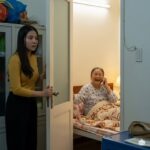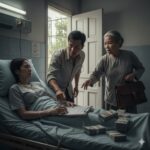— The Memory of the House in the Back
Since Mang Turing was brought back inside the house, the course of the night has changed. There is the clank of a spoon hitting a mug every nine o’clock, signaling his hot milk; there is the rustle of slippers in the hallway every dawn. His stories are still repeated—about his first wooden boat, the wind that once tore the sail, the salty taste of sweat—but now, someone is listening. Mario leaning against a pillar, Elena quietly peeling a mango, and Rosa holding a small notebook.
— “Grandpa, I’ll continue what we wrote last night—‘Sea Notebook’,” Rosa said, her eyes twinkling.
Mang Turing nodded and stroked his grandson’s hair. At the edge of the table, Elena nodded softly as well. The weight on his chest was not over yet, but she had learned to make regret a path, not a wall.
The next day, they took Mang Turing to the barangay health center. The doctor carefully explained:
— “There are signs of dementia. This is not a quick verdict; this is a reminder. Adjust your routine, wear an ID with your name and address, avoid walking alone at night, and most of all—be patient for a long time.”
They returned home with a list: a bell on the door, a small light in the hallway, a clock with large numbers. In Mang Turing’s pocket, Rosa slipped a handwritten postcard: “I am Turing. I am going home to Mario’s house by the mango tree.”
One early morning, the fog was thick and the wind seemed to whisper in the coconut leaves. Rosa woke up to the slight creaking of the window. There was no one in Mang Turing’s bed.
— “Daddy,” Rosa’s voice trembled, “Grandpa is gone…”
Nervousness flared in Mario’s chest. He came out carrying a torch, followed by the light of Elena’s flashlight. In the yard, the stars were silent; in the backyard, the old hut stood gaping—empty.
— “To the shore,” Mario whispered. “That’s where his mind always goes.”
They ran to the shore. There, at the end of the wooden bridge, Mang Turing sat, looking out at the dark place where water and darkness meet. He held a piece of rope, as if the boat was still tied up, whitened by time.
— “Dad,” Mario panted, “it’s cold. Let’s go home.”
Mang Turing shook his head, but his smile was gentle.
— “Don’t worry, Mario. Look. The sea is calm. If I had someone with me, I could have.”
Mario blinked. In an instant, he saw his own youth—riding in the stern of the boat, his whole body wet, gasping for breath while Dad rowed in front.
— “You have someone with you, Tay,” he replied, tightening the cloak around his father’s shoulders. “From now on, the three of us—you, me, and Rosa—will row together.”
Mang Turing closed his eyes as if he had found the right combination of wind. They led him home slowly, as if they were guiding a boat that had just been pulled out of the sand.
The next day, they made a decision: they would not destroy the hut. Instead, they would make it a “Memorial to the House in the Back.” They cleaned the floor, removed the torn iron, and hung up the old net with the shells. In one corner, Mario placed an old lamp that had been stripped of its rust; on the wall, Elena hung a picture of Mang Turing as a young man, holding the largest catch in the village.
— “We will sit here every afternoon,” said Elena, drawing a smile that had not appeared on her lips for a long time. “Stories, tea, and air.”
Elena uttered a short word to herself:
— “Turing, if you hear this in your heart—I am taking back the cold.”
That is where Mang Turing spent his afternoons: sitting on a stool, listening to the sun play on the roof of the hut, and to Rosa’s voice reading from the “Sea Notebook.”
— “First page, Grandpa: ‘How to learn to calm down even when the waves are angry.’”
— “Write it down too,” replied Mang Turing, “‘How to apologize to yourself when you don’t immediately understand the fatigue of others.’”
Elena looked at him, nodded, and nodded slowly.
The Village Festival arrived. In the plaza, there was a competition in net weaving and in arranging the puspos. The Captain asked Mario to give a short message about caring for the elderly. He was nervous, but he stood up. At the edge of the stage, Elena held Rosa’s hand.
— “We made a mistake,” Mario began, listening to his own voice. “We put the person who had been our whole life ahead of us in the backyard. We thought we needed silence; in fact, what we didn’t give was sympathy.”
The village was silent, except for the birds that flew overhead. Mario continued:
— “If you have a hut in the backyard that represents the cold, maybe you could make it a place of living memory—not a tomb of a voice that keeps repeating itself. There are days when patience runs out, yes. But memory—that should never run out.”
After the speech, a few neighbors came over: a grandmother who was home alone, a father who couldn’t remember the way home. The village started a small organization: “Grandpa and Grandma Watch.” They put up a list of numbers to call, set a time for the visit, and taught simple signs on how to talk to someone with dementia: slowly, clearly, and with a smile.
That evening, someone knocked on the door. Tisoy, Mario’s childhood friend, was carrying a box.
— “This is for you, Turing. I’ve had it for a long time—that box of wooden necklaces and coins that you used to make a gift. You said you’d give it back to me when you were able to rest.”
Mang Turing opened the box. There was a piece of handkerchief, light red, and a small tin container. Inside, there was a piece of paper torn from an old notebook, handwritten:
“For my grandson’s studies. When he’s ready to enter the wider sea.”
Rosa looked at Grandpa, her hug tightening.
— “Grandpa, is this for my college?”
— “Yes, son. In case you get lost, you have a light in your pocket.”
Elena looked at the letter, tears flowing—no longer anger, but recognition.
One night, rain poured down. On the roof, it seemed like the sky was drumming. Mario and Elena moved chairs inside the hut, bringing the thermos of tea and biscuits. They sat around Mang Turing, as if guarding a light that must remain awake.
— “Tell me more, Tay,” said Mario.
The flame in the lamp flickered. The rain subsided, as if listening.
— “The first time I took you fishing, Mario,” began Mang Turing, “it wasn’t because you were a strong rower. I took you so you could see that the sea is also afraid, sometimes. Even though it’s big, it chooses to retreat so as not to swallow you. So when the problem is big, you can also retreat to breathe—that’s not cowardice, that’s a way to move forward.”
Mario listens. Elena looks at the two men in her life—different ages, same heart rhythm. Rosa writes, recording every sentence.
When the rain subsided, a cold breeze blew through the crack in the wall. Mang Turing’s ID was pinned to a nail: “I’m going home to Mario’s house by the mango tree.” Elena smiled and transferred it to Mang Turing’s pocket, then gently folded the square handkerchief and tucked it into the other pocket.
— “To make the light complete,” she said.
From then on, the house in the back was no longer a place of forgetting, but a room of remembrance. There they brewed tea at dusk, there they sewed up the tears in their hearts, and there they listened to stories that, even when repeated, had a new lesson with new patience.
And whenever a newcomer to the village told a story about a parent or grandparent who was “noisy and repetitive,” Mario would say:
— “Try to rearrange the seat he’s sitting on. Sometimes he’s not noisy—we’re the ones who don’t know how to listen.”
On the last page of “Kwaderno ng Dagat,” Rosa writes:
“Love is not always quiet. Sometimes it hums like the wind in the leaves, sometimes it ripples. But when there is a house behind—a peaceful space where memories can rest—we can always and always come home.
News
Pinagtawanan ang Babaeng Tagahugas ng Plato Dahil sa Pagtatabi ng Tirang Pagkain — Hanggang Isiniwalat ng Nakatagong Kamera ang Katotohanan/hi
Pinagtawanan ang Babaeng Tagahugas ng Plato Dahil sa Pagtatabi ng Tirang Pagkain — Hanggang Isiniwalat ng Nakatagong Kamera ang KatotohananHuling…
ISANG MAHIRAP NA MAG-ASAWA NA HINDI MAGKAANAK, NAKATAGPO NG TATLONG SANGGOL SA NIYEBE — DALAWANG DEKADA ANG LUMIPAS, AT IPINAKITA NG MUNDO KUNG ANO ANG TUNAY NA PAMILYA…/HI
ISANG MAHIRAP NA MAG-ASAWA NA HINDI MAGKAANAK, NAKATAGPO NG TATLONG SANGGOL SA NIYEBE — DALAWANG DEKADA ANG LUMIPAS, AT IPINAKITA…
PINULOT NG JEEPNEY DRIVER ANG SANGGOL NA INIWAN SA KANYANG PASADA, AT NAPALUHA SIYA NANG ITO MISMO ANG DOKTOR NA NAGSALBA SA KANYA PAGKALIPAS NG 23 TAON/hi
PINULOT NG JEEPNEY DRIVER ANG SANGGOL NA INIWAN SA KANYANG PASADA,AT NAPALUHA SIYA NANG ITO MISMO ANG DOKTOR NA NAGSALBA…
HINAGISAN NG CUSTOMER NG PAGKAIN ANG RIDER DAHIL “LATE” DAW, PERO NALAGLAG ANG PANGA NIYA NANG TANGGALIN NITO ANG HELMET/hi
HINAGISAN NG CUSTOMER NG PAGKAIN ANG RIDER DAHIL “LATE” DAW, PERO NALAGLAG ANG PANGA NIYA NANG TANGGALIN NITO ANG HELMETBumabagyo…
NATAKOT ANG STEP-DAD NANG IPATAWAG SIYA SA PRINCIPAL’S OFFICE, PERO NABASA NG LUHA ANG MATA NIYA NANG IPAKITA NG GURO ANG DRAWING NG BATA/hi
NATAKOT ANG STEP-DAD NANG IPATAWAG SIYA SA PRINCIPAL’S OFFICE, PERO NABASA NG LUHA ANG MATA NIYA NANG IPAKITA NG GURO…
Sa kabila ng karamdaman ng kanyang asawa sa ospital at ng mga batang nangangailangan, isinama siya ng asawa sa isang paglalakbay sa Europa para sa Pasko. Ang biyenan ko ay nagpunta sa lungsod, nakita ang katotohanan, at gumawa ng isang malaking bagay sa kanyang sarili na nagpahirap sa buong pamilya na mamuhay sa takot…/hi
Ang hapon ng ospital sa pagtatapos ng taon ay malamig hanggang sa buto. Ang maputlang puting fluorescent light ay nagniningning…
End of content
No more pages to load












